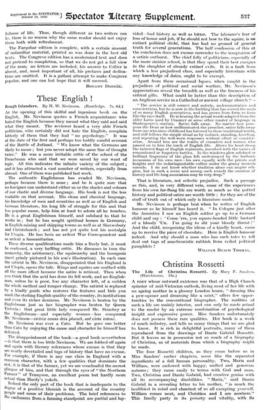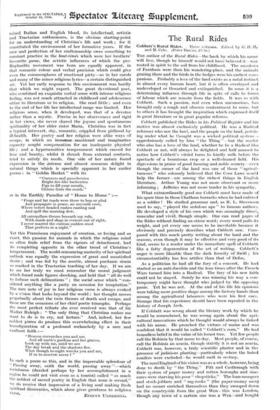Christina Rossetti
A POET whose outward existence was that of a High Church spinster of mid-Victorian outlook, living most of her life with FM ageing mother in a gloomy London house, " dressing like a pew-opener and dreaming like a saint," offers few oppor- tunities to the conventional biographer. The realities of such a life are mainly interior, and can only be made actual to the reader by an extreme combination of psychological insight and expressive power. Miss Sanders unfortunately does not possess these rare qualities. Her book is a work of much industry, and tells us many things that we are glad to know. It is rich in delightful portraits, many of them reproduced from the drawings of Dante Gabriel Rossetti. But it leaves us in possession not so much of a biography of Christina, as of materials from which a biography might be made.
The four Rossetti children, as they come before us in Miss Sanders' earlier chapters, seem like the separated ingredients of a full human personality. Two, Maria and William, were endowed with happy, unified and generous natures ; they came easily to terms with God and man. Two, Christina and Dante Gabriel, had creative genius with all its accompanying disabilities. " Maria," said Dante Gabriel in a revealing letter to his mother, " is much the healthiest in mind and cheeriest of us all excepting yourself. William comes next, and Christina and I are nowhere." This family party in its poVerty and vitality, with its
mixed Italian and English blood, its intellectual, artistic and Tractarian enthusiasms, is the obvious starting-point for an understanding of Christina's life and work ; for it constituted the environment of her formative years. If the ease and perfection of her craftsmanship owes something to constant practice in the bout-rinds which were her brothers' favourite game, the artistic influences _ of which the pre- Raphaelite movement was born are equally apparent, in that romantic colour and verbal precision which could give even the commonplaces of emotional piety—as in her carols and many of the minor religious lyrics—a certain distinguished air. Yet her early response to this environment was hardly that which we might expect. The great devotional poet, who combined an exquisite verbal sense with intense religious feeling, was not much attracted in childhood and adolescence either to literature or to religion. She read little ; and even to the end of her life her intellectual range was limited. Her religious sense, when it developed, was that of a devotee rather than a mystic. Precise in her observances and rigid in her views, she never shared the joyous and spontaneous spirituality of her elder sister Maria. Christina was in fact a typical introvert, shy, romantic, crippled from girlhood by ill-health. Her poetry and her religion were alike ways of escape, in which an immense ,aiamotional, and imaginative capacity sought compensation for -an inadequate physical life ; and a hypersensitive temperament which craved for love and beauty, whilst it shrank from external contacts, tried to satisfy its needs. One side of her nature found expression in the intense and almost sensuous delight in natural things which is specially apparent in her earlier poems : in " Goblin Market " with its
"Currants and gooseberries Bright-fire-like barberries Figs to fill your mouth, Citrons from the south."
or in the Earthly Paradise of " House to Home " "Frogs and fat toads were there to hop or plod And propagate in peace, an uncouth crew, Where velvet headed rushes rustling nod And spill the morning dew.
All caterpillars throve beneath my rule,
With snails and slugs in corners-Out-of sight. I never marred the curious sudden stool
That perfects in a night."
Yet this Franciscan enjoyment of creation, so loving and so exact, this passion for animals in which the religious mind so often finds relief from the rigours of detachment, had its completing opposite in the other trend of Christina's temperament. The world-renouncing austerity of her spiritual outlook was equally the expression of great and unsatisfied desire ; and was fed by the ascetic, almost puritanic strain so marked in the Tractarian teaching of her day. If we are to see her truly we must remember the moral judgment which found nude figures shocking, and held that " all do well to forbear such delineations " ; the social sense which " con- sidered anything like a party an occasion for temptation." The rare note of joy in her religious verse is always evoked by a vision that looks beyond the world : her thought moves perpetually about the twin themes of death and escape, and these are the occasions of her chief poetic triumphs. Perhaps the most perfect tribute she ever received was that of Sir Walter Raleigh : " The only thing that Christina makes me want to do is to cry, not lecture." And, indeed, her few noblest piices do produce this overwhelming effect in their transfiguration of a profound melancholy by a sure, and exultant faith :— '
"Heaven overarches you and me, And all earth's gardens and her graves. Look up with me, until we see The day break and the shadows flee. What though to-night wrecks you and me, If so to-morrow saves t "
In such a poem as this, and in the impeccable splendour of " Passing away, saith the world, passing away "—which Swinburne (dazzled perhaps by her accomplishment in a region he could not visit even as a tourist) called " so much the noblest of sacred poetry in English that none is second," we do receive that impression of a living soul making fresh spiritual discoveries,-which alone gives greatness to religious
verse, EVELYN UNDERHILL.

























































 Previous page
Previous page